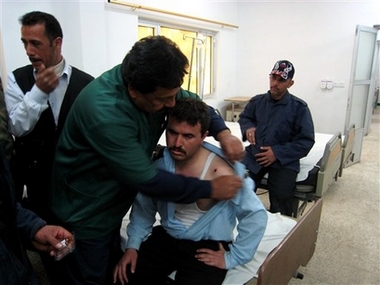Poll: Fear, anger, stress grip Iraqis
(AP)Updated: 2007-03-19 21:38
 A policeman injured in car bombing receives treatment at a hospital in Kirkuk, Iraq, 290 kilometers (180 miles) north of Baghdad, Sunday, March 18, 2007. [AP]  |
-The number of Iraqis who say their own life is going well has dipped from 71 percent in November 2005 to 39 percent now.
-About three-fourths of Iraqis report feelings of anger, depression and difficulty concentrating.
-More than half of Iraqis have curtailed activities like going out of their homes, going to markets or other crowded places and traveling through police checkpoints.
-Only 18 percent of Iraqis have confidence in US and coalition troops, and 86 percent are concerned that someone in their household will be a victim of violence.
-Slightly more than half of Iraqis - 51 percent - now say that violence against US forces is acceptable - up from 17 percent who felt that way in early 2004. More than nine in 10 Sunni Arabs in Iraq now feel this way.
-While 63 percent said they felt very safe in their neighborhoods in late 2005, only 26 percent feel that way now.
The major cause for this sharp reversal in Iraqi attitudes is the continuing violence - bombings, attacks by roving gunmen and kidnappings - that has overwhelmed the country since the US invasion four years ago this week.
Eighty percent of Iraqis surveyed reported some kind of violence nearby, according to the nationally representative survey conducted Feb. 25 to March 5 among 2,212 Iraqis, including oversamples in Anbar province, the Sadr City section of Baghdad, Basra and Kirkuk. Results were subject to a sampling error margin of plus or minus 2.5 percentage points. The survey was done by D3 Systems, a pollster specializing in conflict countries
Iraqi civilian deaths are estimated at more than 54,000, possibly much higher. More than half of Iraqis surveyed said a friend or relative has been hurt or killed in the violence, while almost nine in 10 worried that a loved one will be hurt.
The levels of stress soar outside relatively peaceful Kurdistan, especially in Baghdad and the Sunni-dominated Anbar province, the poll found.
Fewer than half in the country, 42 percent, said that life in Iraq now is better than it was under Saddam Hussein, the late dictator accused of murdering tens of thousands during a brutal regime.
Iraqis pessimism about safety spills over into their views of most aspects of life - the economy, basic needs like power and clean water, even the risks of sending their children to school.
But views of the US military presence are contradictory among Iraqis - just as they are in this country.
About four in five Iraqis oppose the presence of US troops but only a third want those US troops to leave Iraq immediately.
Conducting the face-to-face poll was a difficult ordeal in such a violent country. More than 100 Iraqi interviewers conducted the poll and some reported seeing bombings, beatings and even a mass kidnapping. Several teams of interviewers were detained by police - but every interviewer made it home safely.
|
||
|
||
|
|
